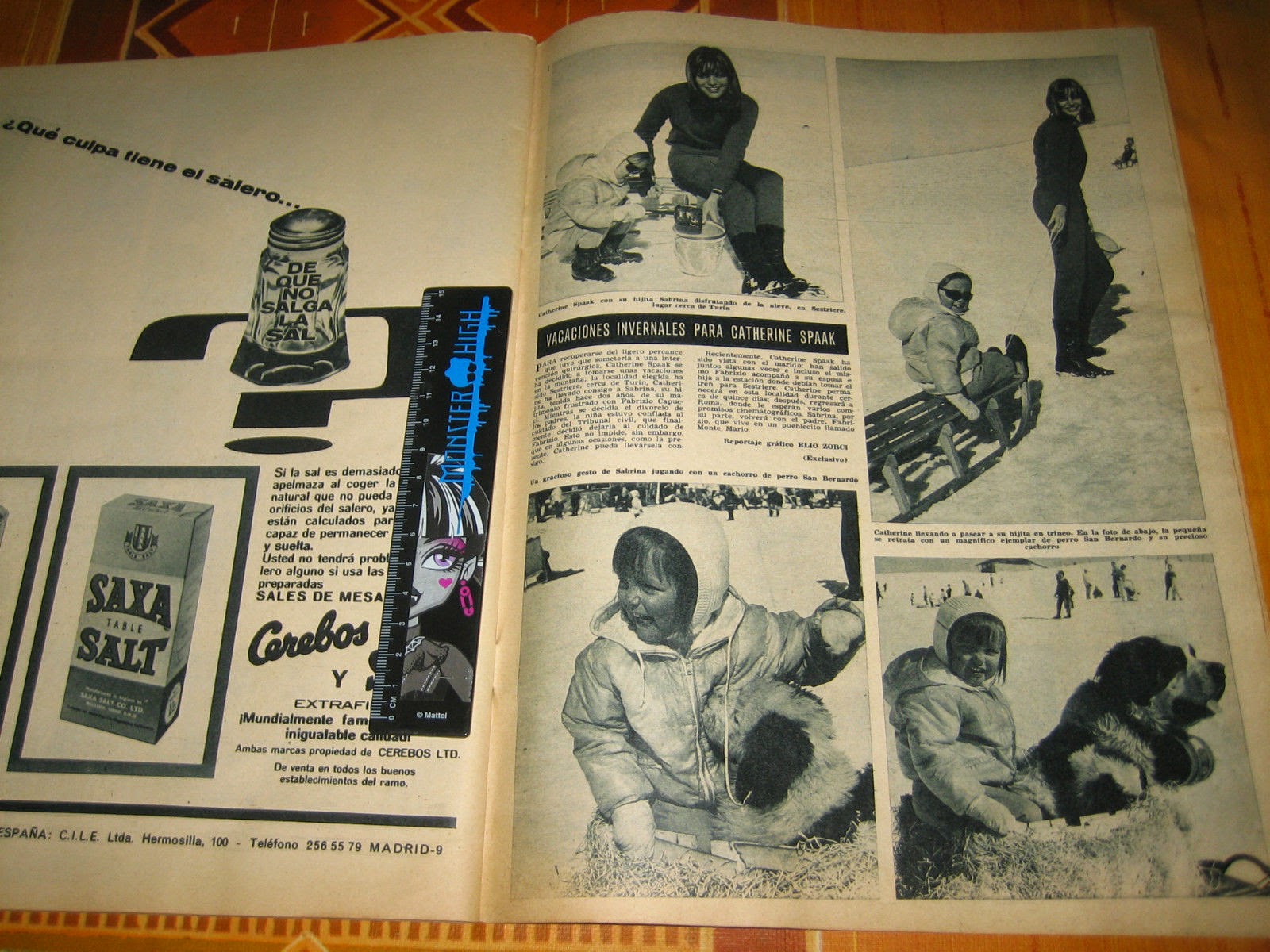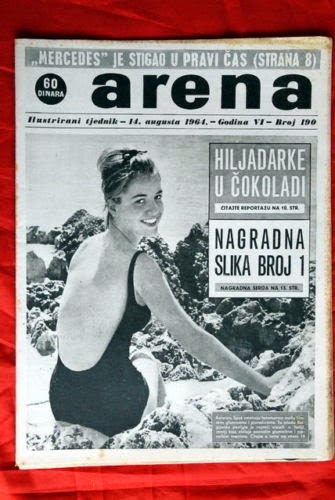As an American fan of Catherine Spaak's work, one of the things that I would most like to discuss with Catherine is her time in the U.S. filming Hotel. It seems like it would have been the realization of a life-long dream for her. After having been inspired by seeing Gina Lollobrigida and Marilyn Monroe on-screen, young Catherine entertained her friends by talking of being a movie star and offering to sign autographs for them. She was so inspired by Audrey Hepburn that she named her first child Sabrina, after Hepburn's famed movie character. Even after getting married and being pressured by the Capucci family and religious advisers to settle down, she rebelled by taking the role of Cecilia in The Empty Canvas, because she said that "This can make me an actress on an international scale." One report in 1966 even indicated that Catherine had signed a deal with Warner Bros. for a film a year for five years. So, all of that begs the question: Why only one Hollywood film?
Catherine was clearly a talented actress with movie-star looks, an engaging screen presence, and proven international box office appeal. Therefore, in trying to answer the question at hand, one might initially wonder: Did something go wrong? Was Catherine too difficult? As far as I have been able to ascertain, the answer to both of those questions is "No." First, Hotel turned out to be a first-class film. Even if it was not a huge hit, it was generally well-received by critics (as was Catherine's performance), and I would find it hard to believe that the film did not make money for Warner Bros. Regardless, if the film was considered an "under-performer" by the studio, that could hardly be pinned on Catherine. There were too many other well-known, key actors in the film for any significant blame to be placed on her. I see nothing about Hotel that should or would have poisoned Catherine's U.S. box office potential. As for working with Catherine, Variety reported that Hotel director Richard Quine hoped to have her star in his next film, describing her as a combination of Audrey Hepburn and Virna Lisi. Clearly, he did not find her difficult to work with, and I have never read anything to indicate that anyone in Hollywood found her to be difficult.
The answer, then, is actually quite simple. Catherine DID NOT WANT TO make any more films in Hollywood after Hotel, because she did not like living in California and working in Hollywood. She felt lonely, working in a strange place, in a new environment (where she had to speak her lines in English for direct sound while the cameras rolled). She was a young, strong-willed, free-spirited, European woman (toughened from being on her own at an early age) that missed her familiar surroundings and friends in Rome, was happier working in Rome, and had all the fulfillment and financial security that she desired through her work there. Apparently, she had reached a point in her life where being "an actress on an international scale" no longer held the same appeal that it once had, assuming that meant working in Hollywood. Furthermore, by 1968, Catherine was working with and influenced by her future husband, Johnny Dorelli. Once she married Dorelli, who did not like for her to work so much, and had another child, Catherine was even less inclined to pursue work in Hollywood. Finally, (though she apparently "dated" in Italy) it's interesting to me that Catherine would have been considered "man-shy" while in the U.S., since she apparently did not "date" while working on Hotel, given the fact that she technically was not divorced from Fabrizio Capucci (because of the difficult nature of divorce in Italy at that time, though some articles refer to her "divorce" rather than what I presume was considered a separation in Italy).
What a loss for Hollywood and American film fans. Much of Catherine's Italian work, as good as it is, has largely been inaccessible through the years to film fans who only speak English. Perhaps it is just a coincidence, but Hotel marked a significant turning point in Catherine's film career. In my opinion, none of Catherine's film work after Hotel was as good as her best work before Hotel. That's not to say that she didn't do good work after Hotel or that none of the films were good, because she did, and some were. However, I do not think that any of her films after Hotel rise to the level of being labeled as "classic Spaak." Put another way, if I made a list of 10 Catherine Spaak movies that all retro film lovers should watch, none of her films after Hotel would make my list.
1. Perhaps the single most insightful source in support of my conclusion is Rex Reed's profile of Catherine in the June 12, 1966 N.Y. Times. The article, called I Am - How You Say? - A Smart Kid, says in part:
"[In reference to her first scene for Hotel, shot in New Orleans with Rod Taylor] It wasn't much of a scene, but for Catherine Spaak, it was important. After a dozen European films and a reputation as the ye-ye queen of the Italian cinema, that simple stroll marked her first appearance before an American camera, and the girl was nervous. ... Pretty classy company for a 21-year-old girl who speaks very little English, but Catherine Spaak is holding her own ground. Half kittycat go-go girl, half petulant defiance, she is like a sexy lollipop...The girl of the hour, but well-bred.
...
But the girl has a mind of her own. 'My family never sees my films, and I never see my family,' she pouts. She left home as a youngster...now sings folk songs, plays the guitar, eats fried oysters and buttermilk, hangs out in places like Rome's Piper Club and loves to shock people by saying things like, 'I acted with Bette Davis in 'The Empty Canvas.' Everyone in Rome was terrified of her. I said only one thing to her: 'Hello.' I am afraid of no one, nothing. The world does not frighten me.'
'I was quite afraid to come here, because I don't want them to make me over into a Hollywood star. My character and temperament are too wild. You can't impose things on me. The most difficult thing is making intelligent answers. It is harder to think in English than to talk in English. It takes me three days to learn one line for the screen. In Italy, while you act everyone screams at you...It drives me mad. Here, the camera rolls and the sound track works at the same time. You don't have to dub it all later. In Italy, we work long hours, until people are fainting. Americans are less explosive, more reserved, but they put me at ease.'
'Two Americans influenced my life. Marilyn Monroe and Audrey Hepburn. The first actresses I ever saw who were beautiful and also feminine. Most actresses are like men. Tough. Beautiful women in Italy are usually aggressive. They could cut your heart out with a fork. People call me a jet setter. I don't want to be classified as anything, not even as an actress. I love the Rolling Stones and The Beatles and do the twist in public bars, but I am also very serious. I run my own life. I've taught myself everything. I compose my own music and make records. I also play sluts, but please remember I once played a nun. I'm just now reaching the point where good Italian writers make scripts for me. I am-how you say?-a smart kid. I let nobody know about my private life, my divorce, my little son [that's what it said, not daughter]. I have to guard myself night and day. The American are not as bad as the paparazzi, they don't follow you into the bathroom, but they are still nosy. I think you respect actors more in America. In Italy, an actor is still someone you can pick up today and have recite tomorrow...Here it is more serious, I think.'
...'If I were in Rome tonight, I would take you to my favorite bar, called Purgatory, and buy you an Irish coffee. Do you think I am - yes, I am - homesick'."
2. An interesting article appeared in a Detroit newspaper in June of 1967. It was called "A Lady In Show Business - Catherine Spaak" (I found it glued to the back of a press photo). The article stated:
"Miss Catherine Spaak has just emerged from her first American movie in the high-voltage star-spangled climate of Hollywood and she is still tingling with shock.
If this is what it takes, she seems to be thinking, she may say, 'No thanks. Arrivederci,' and return to her cozy apartment on the Piazza di Espana in Rome.
The leggy Parisian-born Belgian beauty doesn't put it so bluntly but there are glints of determination smoldering in the lustrous brown eyes when she talks about her life and her ambitions.
'I know what I want. I want to be myself. I don't want to be a thing that people push around and make do things I don't want to do. I don't want to be used...I hate scandals. I do not like bad publicity. I do not like to go places to be seen.'
'For me being an actress is being just another woman who works. I have the problems and dreams of a woman-that's all. Money cannot buy anything I want. To be happy, to be in good shape, that is all that is important'."
3. The Warner Bros. snipe on the back of one of the promotional stills for Hotel says:
"MAN-SHY--Catherine Spaak, 21-year-old European star, proved to be man-shy, at least of Hollywood men, when she came to Warner Bros. to play in 'Hotel.' Actress didn't date during her Hollywood stay."
4. A 1966 article in the Spanish magazine Hola! states (thanks to googletranslate):
"After her triumphs in Italian cinema, Catherine Spaak has signed a contract for her first film in
America, Hotel. For the shoot, the
actress has rented a house in
Los Angeles, where she spends her days writing her family. Catherine, who sacrificed her marriage for fame, thanks
to this agreement sees her future brighter
than ever.
Catherine said that she's happy with her new home, but sad not to see the city for lack of time. But, having installed a telescope in the garden, she can see it from there, and it looks wonderful. The actress believes that the most pleasant moments in her new home are those playing guitar, her only luggage on this trip."
Catherine is quoted as saying, "I have had the opportunity to be bigger than I am, to be more internationally known, but I have consciously stepped aside from it. If I had set my heart on being first, I might have achieved it, but only at the expense of things far more dear to me-home and family and leisure interests. I worked hard for ten years, film after film in Italy and France, and I saw what happens to people who become career obsessed. Today, I have a happy marriage, children, a full life. I like to paint and read and sing. I'm the sort of person who likes not to work - and I'm lucky enough not to have to work all of the time. My career takes up a third of my life; the rest is for my home and marriage and private interests." After noting her frank acknowledgement that she did not enjoy her time in California making "Hotel," the pressbook quotes Catherine as saying "I am essentially a European."

.jpg)
.JPG)
.JPG)











.JPG)
.JPG)
.JPG)





















































